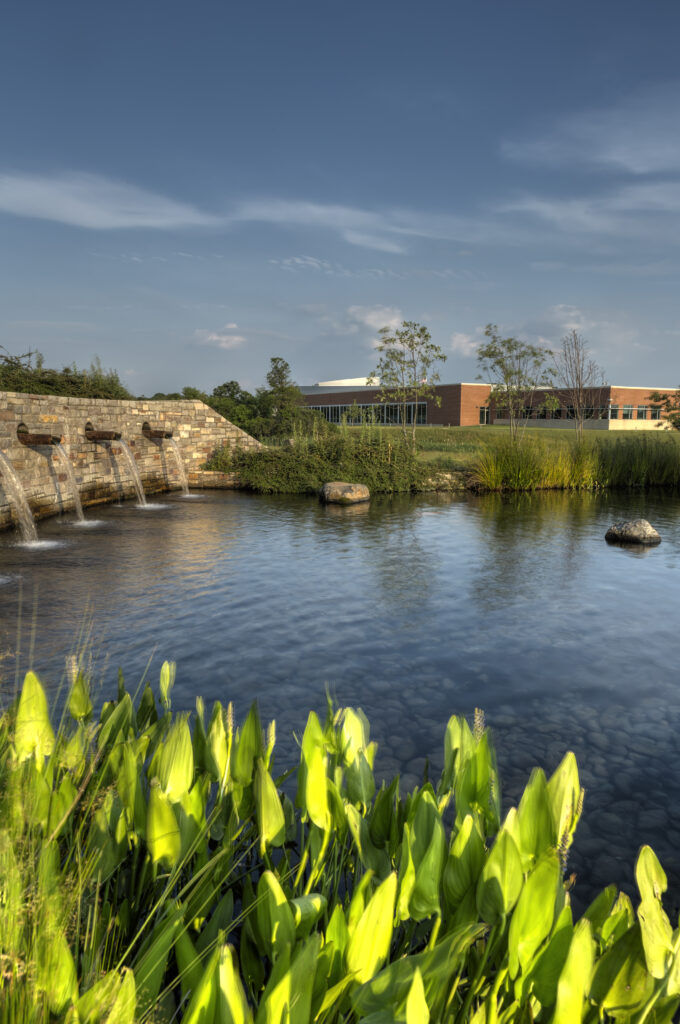Executive Director of Operations and Maintenance Kendra Sveum at Loudoun Water dedicates much of her work to tackling emerging contaminant issues. Loudoun Water’s mission is to ensure a healthy environment and high quality of life through sustainable resource management, covering over 1,483 miles of water distribution pipelines, more than 1,234 miles of wastewater collection system pipelines, and a growing reclaimed non-potable water system. With the pressure of understanding advanced treatment and monitoring upcoming regulations for PFAS in wastewater and biosolids, the focused goal of Loudoun Water is to understand the options regarding advanced technology, engaging in research, and securing funding to mitigate for these emerging issues. As Loudoun and other public municipalities grapple with this emerging issue, engaging in community outreach has become essential to informing the public about their drinking and wastewater needs.
Loudoun Water historically has excelled at reclaiming wastewater and producing a high-quality biosolids product that is beneficially recycled with one of the most advanced wastewater treatment plants in the state. In order to accommodate fast paced growth in Loudoun County, Loudoun Water is not just expanding capacity but also introducing new technology to further improve the quality of biosolids produced. This plan includes constructing and implementing a biosolids treatment process that uses thermal drying to boost capacity as well as produce Class A fertilizer pellets.
Loudoun Water is also an active member of the Norther Virginia Biosolids Community. Loudoun Water facilities process both septage and activated sludge from small wastewater treatment plants in rural Loudoun County. They are also a participating member of a Regional Biosolids Collaboration that focuses on cooperative agreements to support biosolids processing in the region.
Innovation is always ongoing. Loudoun Water supports a robust research program that includes technology base research like the collaboration with Virginia Tech to complete a Thermal Hydrolysis Anaerobic Digestion Pilot as well as area wide water supply research like the Water Research Foundation Project 5269 Understanding the Factors Affecting PFAS Variability in the Potomac River Watershed. As Chair of the VBC Research Committee, Sveum leads discussions on significant studies, including Dr. Ian Pepper’s PFAS National Collaborative Study at the University of Arizona, a test plot examining PFAS and soil health at the Eastern Virginia AREC, biochar applications, and more. Community outreach is just as crucial as research.
Education and outreach are key to Loudoun Water as an important aspect of maintaining a healthy water environment. “We are positioning Loudoun as a resource for the entire community because the work that Loudoun Water does is an essential community service. We are protecting public health and the environment of our community, which is first and foremost an important and key objective of our operations. Our vision is to ensure that our facility meets the need of our growing community while ensuring that our technology addresses the challenges we have before us,” said Sveum. Loudoun Water recently hosted local Virginia state Senators, providing a tour of its operations and discussing PFAS and biosolids. This spring, Loudoun Water hosted 200 people for an Earth Day celebration with a tour of their Aquiary, 3,500 square feet of indoor educational exhibits and over a mile of outdoor trails dedicated to water appreciation. It is a destination for community members to learn about source water protection, water conservation and water and wastewater treatment in Loudoun County.
Loudoun Water also actively engages with Loudoun County Public Schools to help create the next generation of educated community members that understand their role in helping maintain the water environment. So far this year, Loudoun Water has visited three elementary schools to discuss the water cycle with approximately 400 students in support of the Virginia Standards of Learning (SOL) for science programs. At the high school level, Loudoun Water brought the science of wastewater treatment to the Rock Ridge High School AP Environmental Science class. Annually, Loudoun Water participates in many outreach events including the Academies of Loudoun Engineering Week, Regional Science Fair, Job for A Day, and the Leading Ladies STEM internship program. Partnering with area organizations, schools, community members and customers allows Loudoun Water staff to share their knowledge about water and wastewater treatment, conservation, source water protection and emerging issues in the utility industry.
